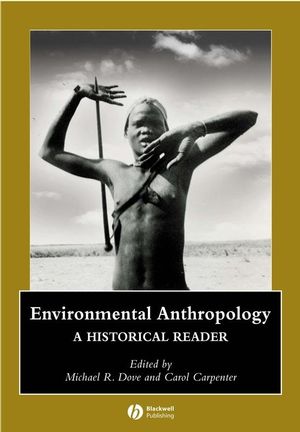|
Textbook
Environmental Anthropology: A Historical ReaderISBN: 978-1-4051-1137-9
Paperback
502 pages
December 2007, ©2007, Wiley-Blackwell
 This is a Print-on-Demand title. It will be printed specifically to fill your order. Please allow an additional 10-15 days delivery time. The book is not returnable.
Other Available Formats: Hardcover
|
||||||
Editors' Biographical Information.
Preface.
Acknowledgments.
Text Credits.
Introduction: Major Historical Currents in Environmental Anthropology: Michael R. Dove and Carol Carpenter.
Part I: The Nature-Culture Dichotomy:.
Questioning the Nature-Culture Dichotomy: From Posey’s Indigenous Knowledge to Fairhead and Leach’s Politics of Knowledge.
1. Indigenous Management of Tropical Forest Ecosystems: The Case of the Kayapó Indians of the Brazilian Amazon: Darrell Posey.
2. False Forest History, Complicit Social Analysis: Rethinking Some West African Environmental Narratives: James Fairhead and Melissa Leach.
How Cattle Problematize the Nature-Culture Divide: From Evans-Pritchard’s “Cattle Complex” to Harris’ 'Sacred Cows' and Beyond.
3. Interest in Cattle: E. E. Evans-Pritchard.
4. The Cultural Ecology of India’s Sacred Cattle: Marvin Harris.
Part II: Ecology And Social Organization:.
Early Essays on Social Organization and Ecology: Mauss and Steward.
5. Seasonal Variations of the Eskimo: A Study in Social Morphology: Marcel Mauss.
6. The Great Basin Shoshonean Indians: An Example of a Family Level of Sociocultural Integration: Julian H. Steward.
Beyond Steward: 'Ecosystems with Human Beings in Them' in Barth and Geertz.
7. Ecologic Relationships of Ethnic Groups in Swat, North Pakistan: Fredrik Barth.
8. The Wet and the Dry: Traditional Irrigation in Bali and Morocco: Clifford Geertz.
“Natural” Disasters and Social Order: Response and Revelation in Firth and Waddell.
9. Critical Pressures on Food Supply and Their Economic Effects: Raymond Firth.
10. How the Enga Cope with Frost: Responses to Climatic Perturbations in the Central Highlands of New Guinea: Eric Waddell.
Part III: Methodological Challenges And Debates:.
Ethnoecology and the Defense of Swidden Agriculture: Conklin and Carneiro.
11. An Ethnoecological Approach to Shifting Agriculture: Harold Conklin.
12. Slash-and-Burn Agriculture: A Closer Look at Its Implications for Settlement Patterns: Robert L. Carneiro.
Natural Science Models of Resource-Use: From Rappaport’s Cybernetics to the Optimal Foraging of Hawkes, Hill, and O’Connell.
13. Ritual Regulation of Environmental Relations Among a New Guinea People: Roy A. Rappaport.
14. Why Hunters Gather: Optimal Foraging and the Ache of Eastern Paraguay: Kristen Hawkes, Kim Hill and James F. O’Connell.
The Bounded and Balanced Community: Solway and Lee, and Netting.
15. Foragers, Genuine or Spurious?: Situating the Kalahari San in History: Jacqueline S. Solway and Richard B. Lee.
16. Links and Boundaries: Reconsidering the Alpine Village as Ecosystem: Robert McC. Netting.
Part IV: The Politics of Natural Resources and the Environment:.
Indigeneity and Natural Resource Politics: Ellen and Li.
17. Forest Knowledge, Forest Transformation: Political Contingency, Historical Ecology and the Renegotiation of Nature in Central Seram: Roy Ellen.
18. Articulating Indigenous Identity in Indonesia: Resource Politics and the Tribal Slot: Tania M. Li.
Environmental Campaigns and Collaborations: Brosius and Tsing.
19. Green Dots, Pink Hearts: Displacing Politics from the Malaysian Rain Forest: J. Peter Brosius.
20. Becoming a Tribal Elder, and Other Green Development Fantasies: Anna L. Tsing.
Part V: Knowing the Environment:.
Social Identity and Perception of the Landscape: Frake and Bloch.
21. People into Places: Zafimaniry Concepts of Clarity: Maurice Bloch.
22. Pleasant Places, Past Times, and Sheltered Identity in Rural East Anglia: Charles O. Frake.
The Limits of Knowledge and Its Implications for Understanding Environmental Relations: Bateson and Ingold.
23. Effects of Conscious Purpose on Human Adaptation: Gregory Bateson.
24. Globes and Spheres: The Topology of Environmentalism: Tim Ingold.
Index of Subjects.
Index of Names



